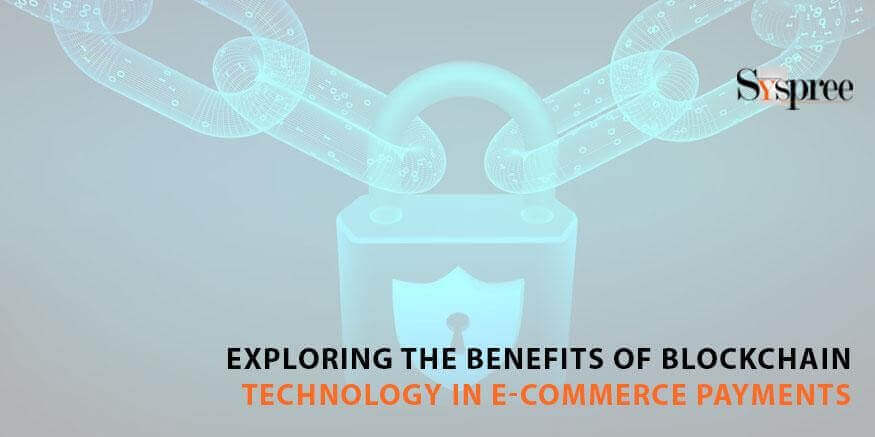The most efficient digital marketing company states that from healthcare and finance as well as supply chain management to today’s e-commerce payments, blockchain technology is on track to transform a wide range of industries. In this blog, we’ll examine the role of blockchain technology in e-commerce payment.
Key Takeaways:
- Blockchain technology offers reliable, secure and cost-effective solutions to electronic commerce payments.
- Blockchain functions as an open, decentralized and tamper-proof ledger. It eliminates the necessity for intermediaries in transactions.
- This technology can bring many advantages to online transactions, such as lower chargebacks and fraud, lower transaction costs, and increased confidence and trust.
- Blockchain’s decentralized architecture permits power processing distribution, making it more adaptable and suitable for large online commerce platforms.
- The security and transparency of blockchain transactions make it simpler for merchants to keep track of transactions and lower the risk of fraud and chargebacks.
Importance of Blockchain in E-commerce Payments:
Payments made through e-commerce are now a regular aspect of our lives; therefore, their protection is paramount. With the growing prevalence of internet fraud, establishing an effective system to protect transactions is essential.
Blockchain technology is a safe cost-effective, efficient, and reliable solution to this issue. By decentralizing payment processing, Blockchain technology removes the necessity for intermediaries, decreasing the chance of fraud and improving transaction speeds.
Furthermore, This technology’s transparent and unchangeable ledger makes it easy for businesses to monitor transactions and decreases the chance of chargebacks. This technology is expected to transform the way that e-commerce transactions are handled.
Its decentralized, secure and clear nature makes it a compelling solution for businesses in the e-commerce industry looking to improve customer service and lower the chance of fraud. Get the help of a leading web design company to understand blockchain’s importance.
How Blockchain Technology Works in E-commerce Payments

Blockchain Technology in E-commerce Payments
Blockchain technology is poised to change how online payment transactions are made, making them faster, more secure, safer, and more cost-effective. We will explore the functions of this technology in the e-commerce payment process and how it helps provide security, transparency, efficiency, decentralization and security.
-
Transparency and Security:

Transparency and Security
One of the main characteristics that blockchain technologies have is their transparency. Every transaction performed on a blockchain is publically recorded and accessible to all. This makes it easier for merchants to monitor transactions and for customers to look up the details of their purchases by utilizing the data obtained from customer journey. The openness of blockchain technology can also make it easier for merchants to spot and avoid fraud.
-
Decentralization:

Decentralization
A further advantage of the blockchain is that it is a decentralized design. Traditional e-commerce payment transactions are processed through intermediaries like banks, payment processors, and credit card corporations. These intermediaries add cost and time to transactions and also act as one point of failure that hackers could attack.
Blockchain technology ensures that there is no requirement for intermediaries. Transactions are handled directly between the seller and buyer, eliminating the need for intermediaries and decreasing the risk of fraud. The result is faster transactions and more cost-effective since intermediaries’ fees are removed.
-
Efficiency and Speed:
Traditional payment methods for online purchases are difficult and unreliable, requiring transactions to take several days or weeks to process and validate. Blockchain technology can revolutionize this process by offering rapid and effective transactions.
If a transaction occurs on blockchains, they are checked by multiple nodes before being added as a block which is then linked cryptographically to prior blocks within the chain. Allow a brilliant creative agency in Mumbai to assist you with the efficiency of payment methods. This process is speedier and more effective than conventional methods of payment that typically involve numerous intermediaries and manual processes.
Advantages of Using Blockchain Technology in E-commerce Payments
Blockchain technology in e-commerce transactions offers many advantages over traditional methods of payment. As there is a surge in E-commerce marketing, we will examine the major benefits of this technology in online payments, such as a reduction in charges and fraud, fewer transaction costs, and a boost in faith and trust.
-
Reduced Fraud and Chargebacks:
One significant benefit of using blockchain technology in online transactions is the elimination of chargebacks and fraud. The transactions made through blockchains are recorded publicly and verified by many nodes, which makes it almost inaccessible to hackers to modify the transaction’s history.
An excellent digital marketing company Singapore believes that it prevents fraudulent activities like the theft of identities, fraud on chargebacks and even fraud with payment.
-
Lower Transaction Fees:
Another benefit of using blockchain technology for online transactions is lower transaction costs. Blockchain transactions are handled directly between the buyers and sellers, eliminating any intermediaries and the associated costs. This decreases the costs of transactions for sellers and buyers and makes it cheaper to conduct transactions via e-commerce.
-
Increased Trust and Confidence:
The security and transparency of blockchain technology increase confidence and trust in online transactions. Buyers can track their past purchases, making it much easier to monitor transactions and spot fraud. This improves faith in security and the security of online transactions and prompts many more to participate in e-commerce.
Blockchain technology in e-commerce transactions offers numerous advantages in comparison to traditional methods of payment. From fewer chargebacks and fraudulent transactions to lower transaction costs and more trust and security, this technology is poised to change how e-commerce transactions are handled.
The top digital marketing company believes that as blockchain technology continues to improve and develop, it is likely that we will witness more companies adopting this technology to enhance the customer or user experience and decrease costs associated with traditional payment methods.
Implementing Blockchain Technology in E-commerce Payments
Blockchain technology in online payments has many advantages. However, the process of implementing it can be difficult. Let’s look at the main actions involved in implementing blockchain technology into e-commerce transactions, such as integrating payment gateways with blockchain technology, selecting the appropriate blockchain platform and knowing all the aspects of technology.
-
Integration with Payment Gateways:
One of the initial steps to adopting blockchain technology into e-commerce payment transactions is to connect it to payment gateways. Payment gateways serve as the link between merchants and processors. They provide the required security and encryption to secure sensitive data. An excellent web design company can assist you in this integration.
When integrating this technology with payment gateways, selecting the payment gateway suitable for the platform you’ve selected is essential so that the transactions can be handled smoothly and safely.
-
Choosing the Right Blockchain Platform:
A crucial step in implementing blockchain technology into e-commerce payment transactions is choosing the right blockchain platform. Many different blockchain platforms are available, each with particular strengths and weaknesses.
When selecting a blockchain platform, It is crucial to think about factors such as the ability to scale, security, and ability to integrate. It is also crucial to consider the cost associated with using the system, in addition to the level of technical proficiency needed to set up the platform and keep it up to date.
-
Understanding the Technical Aspects:
In the end, it is crucial to comprehend the technical aspects of using this technology for e-commerce payment transactions. This involves understanding the blockchain’s basic design and the encryption protocols and security methods used to safeguard sensitive data.
Furthermore, it is essential to be aware of the various technical requirements of the various blockchain platforms, including the requirements for hardware and software, as well as the degree of technical proficiency required to set up the technology and keep it running.
It is equally important to be aware of the development process, including the various tools and programming languages utilized to create blockchain-related applications. This will ensure that the implementation process goes smoothly and that the technology is implemented correctly. Let the most trusted creative agency in Mumbai guide you in understanding the technical aspects.
Challenges and Limitations of Blockchain Technology in E-commerce Payments
Although blockchain technology can revolutionize the electronic commerce payments market, several obstacles and limitations must be overcome before fully utilizing the advantages.
-
Scalability and Adoption:
One of the most significant issues facing blockchain technology in transactions on e-commerce is scaling. The amount of transactions that could be handled on the blockchain network is restricted and can lead to slower transaction times and more costs.
-
Regulation and Compliance:

Regulation and Compliance
Another obstacle facing blockchain technology in e-commerce transactions is compliance and regulation. The regulatory framework of blockchain-related technology is developing, and it can take time for companies to navigate the diverse requirements and limitations across different jurisdictions and countries.
-
Integration with Legacy Systems:
A third and final issue facing blockchain technology for e-commerce payment is integrating existing systems. Many businesses still need to work on outdated processes and systems that make incorporating blockchain technology into their existing systems challenging.
A Comparative Study With Blockchain And Traditional Methods of Payment
Blockchain technology provides a striking contrast with traditional methods of payment. Contrary to traditional methods that depend on intermediaries like banks and payment processors, blockchain technology is based on a decentralized network permitting transactions to be handled directly between sellers and buyers.
This means that intermediaries are not required and decreases the chance of fraud since all transactions are recorded and verified by several nodes. Furthermore, using this technology for e-commerce transactions leads to lower transaction fees, higher speed, and greater confidence and trust.
However, traditional payment methods can be inefficient and slow, and transactions can take several days or weeks to process and validate. In addition, they can be the only source of failure that could become a target for hackers and frequently are accompanied by high transaction fees.
A leading digital marketing company in Singapore states that this technology provides a more secure, efficient, cost-effective, and reliable option for payments made through e-commerce compared to conventional methods.
Future of Blockchain Technology in E-commerce Payments
As the e-commerce sector grows, It is evident that blockchain technology will play a growing part in shaping the next generation of online payments.
1. Predictions and Trends:
Experts believe that blockchain tech will be more critical in the world of e-commerce payment in the coming years and be one of the digital trends. Some of the most significant developments and predictions are:
- The adoption of blockchain technology is increasing in e-commerce transactions as businesses become acquainted with it and its advantages and benefits. The use of this technology in e-commerce payments is expected to grow.
- The increasing popularity of decentralized financial (DeFi) applications: DeFi applications, which permit decentralized financial transactions using the blockchain, are predicted to increase in popularity within the payments sector of e-commerce.
- The rise of emerging blockchain platforms: As the need for blockchain technology in online payments increases, new platforms for blockchain are bound to come up to satisfy the requirements of both consumers and businesses.
2. Potential Use Cases:
Numerous possibilities for using blockchain technology in the e-commerce payment industry include:
- Secure payment: Blockchain technology can provide an encrypted and secure payment platform for online transactions, reducing the chance of chargebacks and fraud.
- Paying across borders Blockchain technology makes it easier for companies to conduct cross-border transactions by reducing the cost and time required for traditional cross-border payment techniques.
- Microtransactions Blockchain technology could allow companies to accept smaller, low-cost transactions, like those used in micropayments or in-app purchases.
3. Impact on the Payment Industry:
The introduction of blockchain technology in the e-commerce payment industry will likely significantly influence the payment industry. Some of the major benefits are:
- Increased competition: The growing usage of technology like blockchain in online payments could increase competition in the industry of payments as new platforms and companies are created to benefit from the technology.
- Increased security: Applying blockchain technology in online payments will greatly enhance your security when making transactions while reducing the chance of fraud and chargebacks.
- Lower cost: Blockchain technology can reduce the cost of online payments for businesses and consumers.
Conclusion:
In the end, Blockchain technology can provide a variety of advantages in online payments, including enhanced security, fewer chargebacks and fraud, reduced transaction fees, and greater security and reliability. Companies that incorporate this technology into their payment procedures will see increased efficiency, speedier transactions, and more secure payment environments. As the e-commerce market expands, it is evident that blockchain tech will increase in creating the future of e-commerce payment methods. Enjoyed this blog? Read the blog post from earlier on The Rise of Super Apps: Revolutionizing the Way We Live and Work.








Thank you for this useful informative post. blockchain in e-commerce payments unlocks secure, efficient, and transparent transactions. Keep sharing more insights.
We are pleased to know you found the blog informative. Do check out our blogs to stay updated about the latest in Digital Marketing